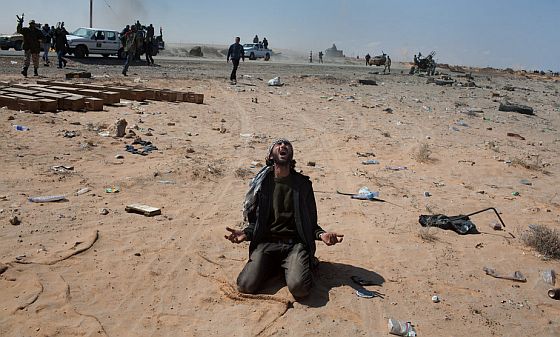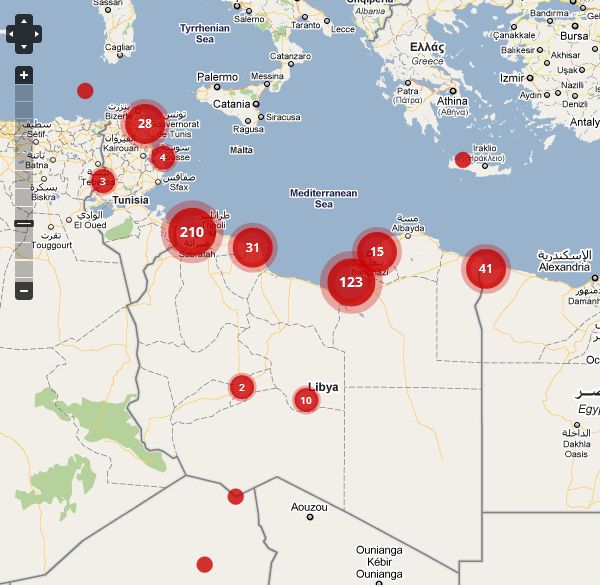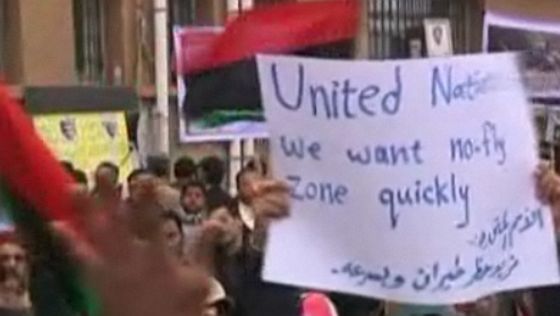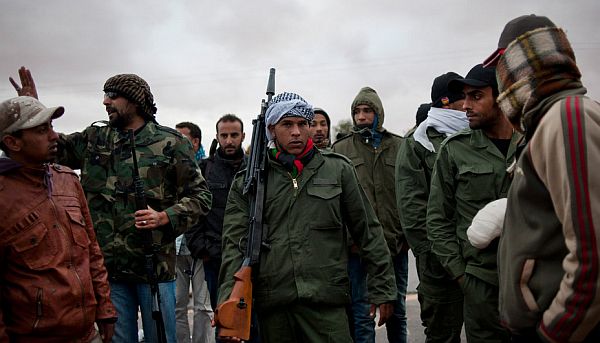“I am very worried about #Libya. I do not want #Gaddafi to win this, and the complicity of the international community is allowing him to.” @Sandmonkey (Mahmoud Salem), Cairo, March 16.
“The fierce urgency of now” is a concept that Obama abandoned the day he got elected. The Decider got replaced with The Deliberator.
For this president, no decision has ever been so urgent that it couldn’t be mulled over for weeks or months. Meanwhile, what for Obama was empty campaign rhetoric, has for Muammer Gaddafi become his means of survival. As the US and Europe have dawdled and deliberated, the Libyan uprising has effectively been crushed.
The New York Times now reports:
With the advances made by loyalists, there is growing consensus in the Obama administration that imposing a no-flight zone over Libya would no longer make much of a difference, a senior official said. Just moving the ships and planes into place to impose an effective no-flight zone, the official said, would take until April, too late to help rebels hunkered down in Benghazi. While administration officials said the United States would not obstruct efforts by other countries to build support for a no-flight zone in the United Nations, President Obama met with his National Security Council on Tuesday to consider a variety of other options to respond to the deteriorating situation. Among those options are jamming Libyan government radio signals and financing the rebel forces with $32 billion in Libyan government and Qaddafi family funds frozen by the United States. That money could be used either for weapons or relief. The meeting broke without a decision, the official said.
“This is another indication of the constant exploration of different options that we have to increase the pressure on the Qaddafi regime as we go forward,” the White House press secretary, Jay Carney, said Tuesday.
But in fact, the administration’s options have narrowed with the dwindling viability of a no-flight zone. The White House is considering more aggressive airstrikes, which would make targets of Colonel Qaddafi’s tanks and heavy artillery — an option sometimes referred to as a “no-drive zone.” The United States or its allies could also send military personnel to advise and train the rebels, an official said.
But given the lack of consensus behind a no-flight zone, these options are viewed as even less likely.
Simon Tisdall writes:
Disagreement between European countries over Libya has moved from the merely embarrassing to the wholly humiliating, after Germany again blocked Anglo-French no-fly zone proposals at a G8 meeting in Paris. The EU’s Libya debacle is now the foreign policy equivalent of last year’s eurozone meltdown, and similarly damaging to its global credibility and influence. Once again, Europe is being forced to confront an unpalatable truth: unless the US takes the lead, nothing gets done. Europe has not been entirely passive in the face of Muammar Gaddafi’s accelerating counter-attack on rebel forces. The EU has imposed sanctions, frozen the assets of leading figures and backed an arms embargo. It has also loudly proclaimed that Gaddafi must go. But these measures have made no appreciable difference on the ground.
On the question of military intervention, there are almost as many opinions as there are EU members. Britain and France are the most outspoken advocates of a no-fly zone. Germany has been the most vocal opponent. Italy – Libya’s former colonial power – havers and trims like a Berlusconi defence lawyer. Last week’s EU summit refused to back a no-fly zone. So did Nato. Today’s G8 communique does not even mention it.
Alain Juppé, France’s foreign minister, suggested Europe had left it too late to stop Gaddafi winning. “If we had used military force last week to neutralise some airstrips and the several dozen planes that they have, perhaps the reversal taking place to the detriment of the opposition wouldn’t have happened,” Juppé told Europe-1 radio. “But that’s the past. What is happening today shows us that we may have let slip by a chance.”
With outright victory now close at hand, Saif al-Islam Gaddafi, in an interview on Euronews, said that a UN decision on a no-fly zone would be of no consequence: “Military operations are over. Within 48 hours everything will be finished. Our forces are almost in Benghazi. Whatever the decision, it will be too late.”
Since France was the first country to recognize the Transitional National Council in Benghazi, he was asked his opinion of the French president, Nicolas Sarkozy:
Sarkozy must first give back the money he took from Libya to finance his electoral campaign. We funded it and we have all the details and are ready to reveal everything. The first thing we want this clown to do is to give the money back to the Libyan people. He was given assistance so that he could help them. But he’s disappointed us: give us back our money. We have all the bank details and documents for the transfer operations and we will make everything public soon.
Al Jazeera reports:
Members of the European Parliament have blasted the European Union for a weak response to the crisis.
Guy Verhofstadt, a former Belgian prime minister, said, to repeated rounds of applause: “This makes me sick!”
In Libya we can change the course of events. There are thousands of heroes. We know who they are but Gaddafi knows as well. He knows their names and their families. If he takes Benghazi it will be nothing more than a massacre, a new Srbrenica, a new Rwanda, a new Darfur.
This makes me sick of the EU. We have learnt nothing at all of history. When Gaddafi is back shall we say business as usual? Are we going to close our eyes again? Will we add one black page more to European history?
Rebecca Harms, a German MEP, said the EU was “refusing to line up on the right side, on the side of the just, and the Arab world will not forget or pardon this weakness from Europe”.
One piece of commentary effectively sums up the Obama administration’s role in what is becoming a disaster for the people of Libya:
New administrations anticipate foreign policy as if it will be baseball or football—a complicated team sport, bound by rules, at which they will succeed by dint of individual skill, clever plays and their all-knowing coach. They suit up, only to discover that their sport will be rafting on a uncharted river in full flood, filled with rocks and whirlpools, through which the frantic crew paddles in opposite directions.
Thus too the Obama administration. It came into office planning resets, nuclear zeroes and Israeli-Palestinian peace. It finds itself instead coping with a vast revolution of politics, society and thought in the Arab world—unforeseen and unforeseeable, fraught with opportunity and danger.
For the moment, the administration has survived several rapids—ditching Egypt’s President Hosni Mubarak in some confusion and with embarrassing but not indecent haste; nudging the ruler of Bahrain into reform without quite pitching him overboard; and, thus far, avoiding a complete capsizing of the boat in Yemen.
But with regard to Libya it has made mistakes that could haunt this country for years to come. The administration prides itself on the president’s unhurried deliberation, his reluctance to act before considering all the angles, his strategic silences and extended consultations. But steer a raft on a wild river that way, and you end up in the water.
From the outset there were three possible outcomes in Libya: Moammar Gadhafi could go quickly, he could go slowly, or he could stay. The best chance of helping him go quickly would have been an unambiguous declaration of intent to see him off, and the willingness to lead a military effort—most likely a no-fly zone—to help Libyan rebels overthrow his regime.
There was momentum a few weeks ago as one town after another fell to enemies of the regime. A stream of defections, betrayals and surrenders seemed to spell Gadhafi’s doom. The time to intervene is when a small push can have the greatest psychological effect, even if military planners would prefer to do it only after orchestrating a three-week air-defense suppression campaign.
Instead of seizing the opportunity, the administration made cumulative mistakes. It was slow in insisting that Gadhafi had to go—but is now committed to that end, exposing itself to humiliation if he does not. It allowed the Pentagon to publicly disparage military measures, reassuring Gadhafi and dispiriting the rebels, when a discreet and menacing silence would have done far less harm. It called for an international effort when the lesson of decades is that NATO and the United Nations find it impossible to act without American leadership. And when the French government showed strategic initiative and pluck, it undercut a major ally.
The moment has passed. The only question now is whether Gadhafi goes slowly, over months, or not at all. Senior American intelligence officials inconveniently observed the other day in front of Congress that the latter seems the likely outcome. What will happen if they are right?
The administration will have put itself in the position of willing the ends, but not the means—a humiliating position for a great power. Gadhafi will need to recover access to European resources to rebuild his oil industry and regain access to his country’s plundered wealth. He can do that in any of a number of ways. He could threaten to open up the spigot of massive African emigration through Libya, to resume work on weapons of mass destruction, or to sponsor terror—all of which he has done in the past. A divided Europe, which includes a timorous Germany and an Italy preoccupied with the prime minister’s bunga bunga parties, will yield.
The administration is teaching dictators, and the populations they oppress, that you can get away with large-scale mayhem if you avoid YouTube. Instead, let the hard men do their work with assault rifles in alleys and soldering irons in lonely cellars. The thuggish leaders will be emboldened, the populations either despairing or desperate. If one hopes to aid the Arab awakening in the direction of more open and just societies, rather than to empower Islamist terror, this policy is perverse. And, finally, the U. S. has provided cover and reassurance for other unsavory actors—a deafening silence, for example, as Iran arrests leaders of the opposition.
This is a disaster for the people of Libya. It is a moral and political calamity for a generation of Western leaders whose reactions to Rwanda and Srebrenica consisted of ineffectual squeaks of dismay. It may deflect the Arab awakening into directions that will horrify us. And it says dangerous things about American foreign policy. Unless it is reversed, the administration’s Libya policy will convince the world that the U.S. is a feeble friend and an ineffectual foe, paralyzed by its own ambivalence.
That this analysis would come from, Elliot Cohen — a neoconservative proponent of military intervention — is hardly surprising. But to those who have warned about the dire implications of Western involvement in a no-fly zone, I would simply ask: who has been well-served by the West’s non-involvement in what will soon be declared a failed revolution?

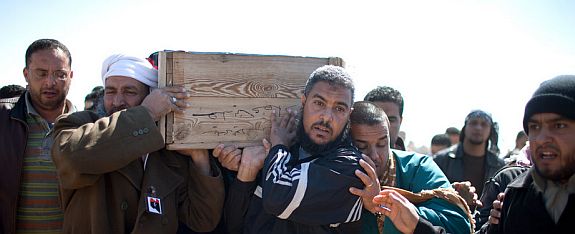
 Ask people in Benghazi what awaits them if Muammar Gaddafi’s army fights its way back into the rebel capital and the chances are they will talk about Huda Ben Amer.
Ask people in Benghazi what awaits them if Muammar Gaddafi’s army fights its way back into the rebel capital and the chances are they will talk about Huda Ben Amer.